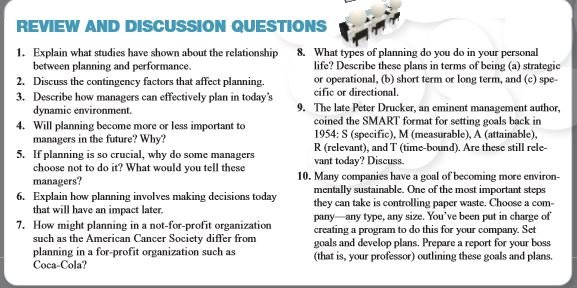What Did You Learn?
What is a plan and why do we need them? A plan is a course of action that involves goal setting, objective definition and analysis of raw information to predict future movements. In business, planning refers to a more elaborate way of solving problems: defining goals, establishing the strategy required to achieve it, and creating plans for supplementing the strategy. Effective planning streamlines the entire organization and maximizes the efficiency. Planning is done for four reasons:
- To provide direction to the manager.
- To establish the standards and goals to be used as parameter.
- To minimize redundancy and wastage of resources.
- To reduce the uncertainty involved.
The relationship between planning and performance depends on the financial performance and good implementation of plans. Many argue that extensive planning before actually being in the situation is not ideal, whereas evidence based planning and management can provide a much better outcome. Planning extensively only in theory is not encouraged due to practical difference in assumed and real life situations. Any plan should be implemented short term, augmented as per feedback, and re-implemented.
Goals are objectives that you need to achieve from planning. Goals are required in any walk of life, business s or otherwise. In management, goals might be real, stated, or financial or strategic, based on the conditions upon which they are classified. Most goals are used a performance standards as well as final objective for the group to achieve.
The need for plans is that they provide a comprehensive big picture of the entire problem solving process: from identification to end stage consequences of implementation. Plans outline the path needed to be taken to satisfactorily reach a goal. There are various types of classifications of goals stated by an organization:
- Strategic plans are applicable to the entire organization, whereas operational ones apply to specific areas within a company. The scope of a goal is reminiscent of it importance and impact on the company.
- If a plan is for more than three years, it is termed as a long-term plan. Short-term plans usually last less than a year. Long-term plans require constant monitoring for changes in conditions, whereas short term plans are quick and can be used to provide future information.
- Specific plans objectify the specifics and leave no room for individual perception. These are specified directives and dictate the steps that need to be taken for completion of the project. Directional plans provide the manager with general guidelines for assessment and management of a particular situation and is open to interpretations and is largely influence by the thought process of the manager concerned.
- When a problem requires a unique plan, then the plan is single-use. For repeated activities, standing plans provide guidance and direction. Single use plans can become standing plans ifthe problem is frequent enough.
Goals can be set either at the top of the managerial pyramid and flow downwards from there, or be mutually defined by superiors and their subordinates. A well-written goal has the following features:
- They are formulated with respect to outcome and in accordance to contemporary conditions.
- They are quantifiable and measurable by objectives, effects, and implications of implementation.
- They have time frames which are made clear for each part of the plan, with detailed sub-goals for each work group.
- They should pose a considerable challenge but is achievable with the specified time.
- They should be written in clear concise terms and all relevant info should be highlighted.
- They should be passed on to everyone who needs to know about it and is affected by it, and their feedback and reaction should be tabulated.
Setting goals involves review and evaluation, along with informed inputs from other group members and proper amendments as per their recommendations. Proper feedback should be welcomed from better flow of information and transparency in the workplace.
Contingencies affecting planning include the manager’s hierarchy, the uncertainty in the surrounding environment, and the duration of commitments in the future. Managers can make decisions themselves or involves their team members and subordinates for more assistance. Constant changes in contemporary constraints should be taken into account and anticipated accordingly.
Plans which are flexible, yet specific are the prerequisite for dynamic situations. Planning must take into account the environmental uncertainties, and all the managerial levels should be involved in it due to diversification of alternatives and lack of time and information. All decisions taken should be anticipatory, not reactionary.
Links of Previous Main Topic:-
- management and organizations a managers dilemma
- Understanding managements context constraints and challenges
- Managing in a global environment
- Managing diversity
- What is social responsibility
- Managing change and innovation
- Managers as decision makers
- Foundations of planning
Links of Next Fundamentals of Management Topics:-





